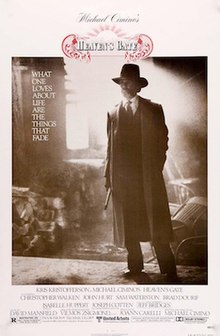Heaven's Gate (film)
| Heaven's Gate | |
|---|---|

Theatrical release poster by Tom Jung
|
|
| Directed by | Michael Cimino |
| Produced by | Joann Carelli |
| Written by | Michael Cimino |
| Starring | |
| Music by | David Mansfield |
| Cinematography | Vilmos Zsigmond |
| Edited by | |
|
Production
company |
Partisan Productions
|
| Distributed by | United Artists |
|
Release date
|
|
|
Running time
|
|
| Country | United States |
| Language | English |
| Budget | $44 million |
| Box office | $3.5 million |
Heaven's Gate is a 1980 American epic Western film written and directed by Michael Cimino. Loosely based on the Johnson County War, it portrays a fictional dispute between land barons and European immigrants in Wyoming in the 1890s. The film features an ensemble cast, including Kris Kristofferson, Christopher Walken, Isabelle Huppert, Jeff Bridges, John Hurt, Sam Waterston, Brad Dourif, Joseph Cotten, Geoffrey Lewis, David Mansfield, Richard Masur, Terry O'Quinn, Mickey Rourke, Willem Dafoe and Nicholas Woodeson, the last two in their first film roles. It is generally considered one of the biggest box office bombs of all time, and was initially described as one of the worst films ever made.
There were major setbacks in the film's production due to cost and time overruns, negative press (including allegations of animal abuse on-set), and rumors about Cimino's allegedly overbearing directorial style; the film resultantly opened to poor reviews, earning only $3.5 million domestically (from an estimated $44 million budget), eventually causing its parent studio, United Artists, to collapse, and effectively destroying the reputation of its director, Cimino, previously a rising Hollywood auteur from the success of his 1978 film The Deer Hunter, winner of the Academy Awards for Best Picture and Best Director in 1979. Cimino had an expensive and ambitious vision for the film, pushing it nearly four times over its planned budget. Its resulting financial problems and United Artists' consequent demise led to a move away from the brief 1970s period of director-driven film production in the American film industry, back towards greater studio control of films, as had been predominant in Hollywood until the late 1960s.
...
Wikipedia
